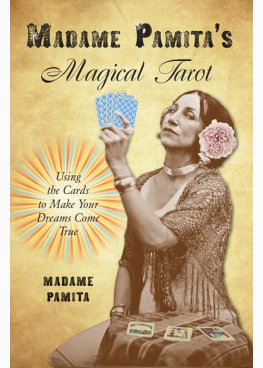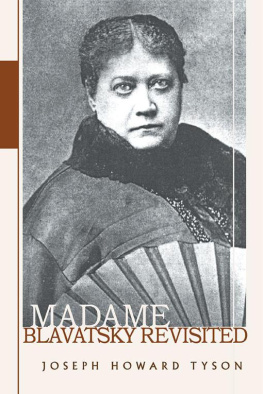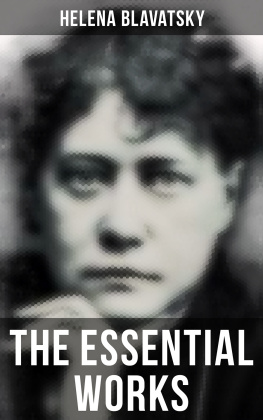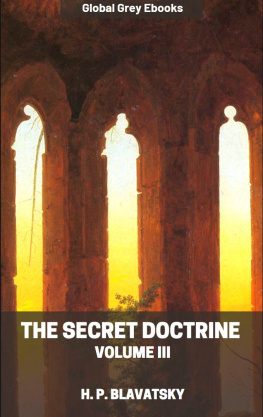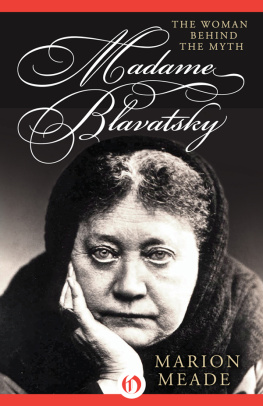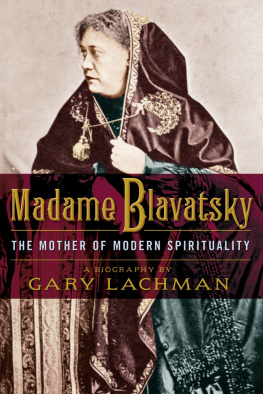Jenny Dix, Secretary of the Bristol Theosophical Society, could not have been more helpful in allowing me access to the library at the Bristol Lodge.
Alan Richardson suggested an approach to the subject that was incisive, and also provided me with some valuable material.
David Matthews offered some excellent information on Blavatskys nativity.
Jane Marshall, and Victoria Brudal, loaned me books and provided much encouragement.
Introduction
In any age, Helena Petrovna Blavatsky, or Madame Blavatsky, as she is usually known, would have been a phenomenon. She possessed the kind of majestic personality which, with consummate ease, dwarfs ordinary folk. Her life was an extraordinary enigma, and as myth breeds other myths, there are not a few surrounding Blavatsky. She has been vilified and championed in equal measure, and it is a struggle to arrive at any balanced view of her achievements, or her shortcomings. What is certain, however, is that she was a courageous and pioneering woman who, largely by her own efforts, established spirituality as an ethos. She also taught that the soul the Inner World of any individual, is a place not to be feared, but cherished.
Inevitably, much has been written about Blavatsky, both during her life and after her death. In the 1990s, eighteen separate biographies in English existed, and the number must inevitably now be greater. Some of these accounts seek to paint a flawless picture of their subject; others attempt to vindicate what are seen as misdemeanors, while a few are openly hostile.
This writer has no literary axe to grind; the motive for embarking on such a study being a fascination and respect for the subject, that, and his own continuing involvement with the metaphysical in all its many guises. Of the latter, the presence of Blavatsky has been most marked whilst the book was being written, and the author trusts that his subject approves of what has been said about her. Knowing now a little of her character, he feels certain that Blavatsky will inform him, and most forcibly, if she does not.
Madame Blavatsky was a remarkable woman, and we owe her a great deal. A singular, driven individual, she saw her mission as being to inform and enlighten the world. These are high ideals, and her reward has not been equal to her efforts. Blavatsky deserves to be given due recognition as one of the most significant figures in the esoteric milieu. She knew only too well that far-reaching changes were coming to the world in the twentieth century. Her beliefs and her vision are even more relevant now in the twenty-first century than when she first voiced them.
Gordon Strong
November 2009
1
Early Days and Early Travels
I cannot forecast to you the action of Russia. It is like a riddle wrapped in a mystery inside an enigma.
Winston Churchill
A cholera plague raged through Europe on the night that Elena Petrovna Hahn was born. At her baptism, the robes of the hastily summoned priest caught fire. Such was the auspicious beginning to the life of one of the most extraordinary characters of the nineteenth century, one whose influence would last much longer than her comparatively short sojourn upon this Earth. The heavens chose 12th of August 1831 for her birth, in Ekaterinoslav, a district of the Ukraine, then part of the Russian Empire. She was the child of a Colonel in the Russian Army, Peter Von Hahn, and his wife, Helena Andreyevna. The name Hahn is a patronymic form of Johannes and derives from hane, high German for rooster. The symbolism of this creature is of conceit, and sexual activity both qualities that would later be attributed to our subject, and not always fairly.
Her mother claimed the lineage of one of the oldest Empire families, a direct descendant, she said, of Grand Duke Rurik, the first ruler of Russia. It was perhaps inevitable that her mother should be a novelist, and Helenas sister Vera, also wrote occult fiction. The education of Helena, as she was soon to be called, came to be supervised by her maternal grandmother. This lady was a princess, her husband, the governor of Saratov. Of Helenas other relations, most prominent was her first cousin Sergei Witte, who later became prime minister of Russia in the reign of Tsar Nicholas II.
Inevitably, such a privileged background would do much to determine the kind of childhood Helena would enjoy. What made this little girl different from her peers was the strength of her inner life. This quality would ensure that she would never be just a conventional member of the elite in Russian society, and her contacts with the other side also made her both sensitive and wilful. Much that terrified her as a child was propagated by her own imagination, and in later years her often morbid sensibility led to an inability to accept criticism, or even what might be termed sensible advice. She was idealistic, nave and often unworldly. That said, she commanded respect, and considering her capricious temperament, a great many people throughout her life were completely devoted to her. Few recollections exist of Helenas childhood, but this, from the pen of an unnamed aunt, is revealing:
She wasvery lively and highly gifted, full of humour, and most remarkably daring; she struck everyone by her self-willed and determined actionsHer restless and very nervous temperament, one that led her into the most unheard-of ungirlish mischiefher passionate love and curiosity for everything unknown and mysterious, weird and fantastic; and foremost of all, her craving for independence and freedom of action a craving that nothing and no one could control; all this, combined with an exuberance of imagination and a wonderful sensitiveness, ought to have warned her friends that she was an exceptional creature




